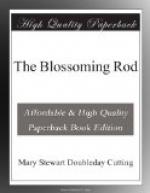“Is that so?” said Langshaw absently in his turn. He had a momentary sense of being set back in his impulse to confidences that was not, after all, untinged with pleasure. His delightful secret was still his own, unmarred by unresponsive criticism. “By the way, Clytie, I don’t like the way George has been behaving lately. He hasn’t shown me his report from school in months; whenever I ask him for it he has some excuse. Hello! Is that little Mary crying?”
“I wonder what on earth has happened now!” exclaimed the mother, rushing from the room, to return the next instant, pulling after her a red-cloaked and red-hatted little girl who sought to hide behind her.
“Well, what do you think she’s done?” Clytie’s tone was withering as she haled forth the shrinking culprit, her small hands over her eyes. “She lost her purse with the dollar she had saved up for your Christmas present—lost the money for dear father’s present; and all because she took it with her to buy a five-cent pencil—a green pencil with purple glass in the end of it; to buy something for herself before Christmas!” Clytie paused tragically. “Of course, if she hadn’t taken her money out to spend it on herself she wouldn’t have lost it!”
“I don’t care!” burst out the culprit, her big dark eyes, just like her mother’s, flashing from under her brown curls, and her red lips set defiantly. “It was my own money, anyhow, if I did lose it. I earned it all myself. It wasn’t yours!”
“Oh! Oh! Oh!” interposed the father in gentle reproof. “Little girls mustn’t talk like that to dear mother. Come, get up here on father’s knee—so.” He took off the red cap, tucked the brown curly head in the bend of his arm, his chin resting on the top of it as he went on, with the child’s small hands clutching at his. “Mary must always do what mother says; but, so far as this money is concerned, you can make me something that I would like far better than anything you could buy. Why don’t you make me another pincushion, for instance? The one you gave me last year is quite worn out.”
“A pink one?” asked Mary faintly.
“Yes. What’s the matter now?” The child had suddenly wriggled to a kneeling posture in his hold and had her little strangling arms round his neck in a tempest of sobs.
“I don’t want to give you a pi-ink pincushion—I don’t want to! I want my dollar! I want my dollar—to spend! I want—Father, I want my dollar—my do-o-ol-lar! I want my—”
“What did I tell you, Mary Langshaw?” cried Clytie. She appealed to her husband. “It’s just the way I knew she’d act. Now I suppose you’ll have to give it to her. Mary, be still a moment—her head is so hot!”
“There, there!” said Langshaw soothingly. “She shall have her money this minute.”
“Of course she doesn’t deserve it,” said Clytie, but with a tone of relief in her voice that seemed oddly greater than the occasion warranted. Mary had wound herself round him passionately; her sobs were dying away happily in long, deep breaths at intervals. Baby, being undressed on her mother’s lap, was laughing over some pieces of gilt paper. In the heart of this domesticity it was as if the father and mother were embarked with this little company on a full and swelling river of love, of which they felt the exquisite soothing ripples.




